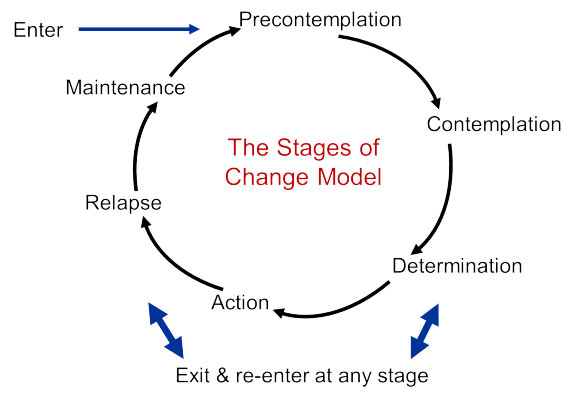Now that we’re one month into 2015, many of you will have thrown in the towel on your New Year´s Resolution. Some of you might not have set one at all, while others of you were going strong for the first two weeks and then “fell off the wagon” in mid-January. If you´re one of the many people who haven’t been able to stick to whatever plan you had in mind, you might be feeling “lazy,” “unmotivated” or even considering whatever resolution you had in mind to be a “lost cause.”

However, what if the fact that you weren’t able to follow through with your goals was related to where you stand in what psychologists refer to as “The Stages of Change¨ model? Would you be able to treat yourself and your supposed “failure” with a more compassionate attitude? And would you possibly consider jumping back on that wagon and starting again? Let’s take a look…
- Precontemplation: In this stage you may have heard from others that you ought to make a change, but you´re not actually considering doing anything about it.
- Contemplation: You´re considering making a change and imagining what it might be like if you did make that change.
- Preparation: You´ve started gathering information and support and are almost ready to take the first steps.
- Action: You´ve taken the first steps to put your plan into action.
- Maintenance: You´re in this stage when you have been diligent at carrying out actions that you had committed to for at least six months.
DeClemente and Prochaska’s Stages of Change Model has been largely used in the field of addictions for understanding why some people are able to stop drinking or using drugs, while others stay stuck in a standstill. Many therapists, including myself, have also found this model to be helpful when working with patients with Eating Disorders. These patients are notorious for having poor treatment outcomes, which can be really frustrating for those professionals trying to treat them, as well as the families and the patient’s themselves. However, by stepping back and asking these patients, “how ready are you to change?” the apparent resistance to treatment can be seen for what it really is: that the patient is not ready to change, yet.
And that word «yet», holds in it one of the keys to this model. It allows you to see that whatever stage you are currently at is only temporary and therefore advancing towards your goals is a matter of identifying what you need to help you increase your readiness to change and therefore advance to the next stage. Another important aspect of this model is that it normalizes «falling off the wagon.» It acknowledges that behavior change is more often than not a nonlinear process meaning we often must take «two steps forward, one step back» in order to advance towards our goals.
The Stages of Change Model is not only reserved for such serious problems as the treatment of drug addiction and Eating Disorders. It can be applied to anyone interested in making a change in their lives, whether it is to procrastinate less, go to the gym more or wake up without hitting the snooze button so many times.
What New Year’s Resolution did you set for yourself this year? Or wish you had set for yourself? Take a look at the model above and ask yourself what stage you´re at in relation to this resolution. Working with a therapist can help you to identify where you are, what is blocking you from moving forward and together you can work to create a personalized plan to help you work towards giving your New Year’s Resolution the second chance it deserves this year.

